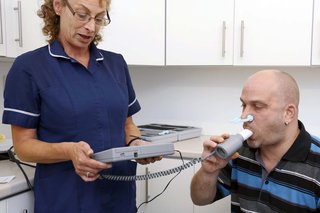Why a spirometry test is done
You might be referred for a spirometry test to:
- find out if symptoms you've been having are caused by a lung condition, such as asthma, chronic obstructive pulmonary disease (COPD), or pulmonary fibrosis
- monitor a lung condition if you already have one, for example to see how well treatment is working
- check your general health before having surgery
You may also be offered a test if:
- you're over 55 and smoke, as part of lung cancer screening
- you're at risk of having a lung condition
You will be sent an appointment or told how to book one.
Preparing for a spirometry test
You'll be told how to prepare for a spirometry test.
You may be asked:
- not to smoke for 24 hours before the test
- not to eat a large meal for at least 2 hours before the test
- not to drink alcohol for at least 4 hours before the test
- to wear loose clothing for the test
You'll be told if you need to stop taking any medicines or using inhalers before your spirometry test.
What happens during a spirometry test
A spirometry test will be done by a healthcare professional at a GP surgery, clinic or hospital.
Before a spirometry test
The healthcare professional will check you're well enough to have the test and ask about any medical conditions you have, or have had recently.
This is because it's not safe to have a spirometry test if you:
- have a chest infection
- have certain conditions such as heart problems and uncontrolled high blood pressure
- recently had a heart attack or stroke
- recently had some types of surgery
They will also measure your height and weight, which they need to calculate your results.
During a spirometry test

When you're ready for the test, you'll be asked to:
- Sit next to a device with a tube attached (spirometer) – a soft clip will be put on your nose.
- Take a deep breath in, so your lungs are completely filled with air.
- Close your lips tightly around the tube.
- Breathe out as quickly and strongly as you can, so you empty your lungs fully.
- Repeat the test 2 more times.
The healthcare professional may ask you to use an inhaler and repeat the test again after a short break. This helps check if using an inhaler affects your result.
The appointment should take no more than an hour.
After a spirometry test
You may feel dizzy or faint during, or shortly after, your spirometry test but this should not last long.
Getting your spirometry test results
A specialist will look at your test results and send them to your doctor.
You should get them within a few weeks. You can call your GP surgery if you have not heard anything after a few weeks.
If there's a problem with your lungs, your doctor will explain what your results mean and discuss the next steps with you.
Page last reviewed: 19 June 2025
Next review due: 19 June 2028